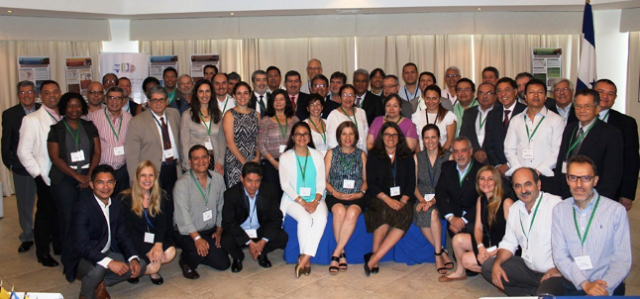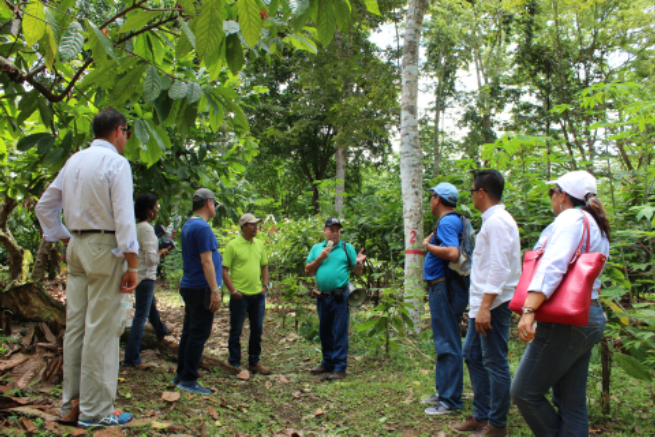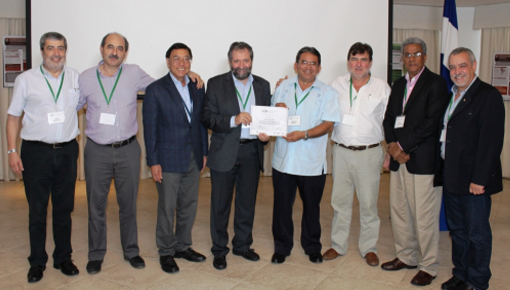Scientists met with authorities from national agricultural research and innovation institutes to analyze progress made by over 20 ongoing projects.

Agricultural researchers continue making progress in adapting smallholder agriculture to climate change in Latin America.
From June 20 to 23, researchers from 16 countries met in La Ceiba, Honduras, to analyze innovations generated through regional efforts involving research organizations, academic institutions, small farmers’ organizations and the private sector.
The scientists met with authorities from national agricultural research and innovation institutes to analyze progress made by over 20 ongoing projects. The efforts are bearing fruit.
Two projects have been implementing sustainable intensification of rice systems in five countries, thus reducing the use of seeds and water, and increasing crop productivity.

A cacao project developed techniques to prevent losses due to inadequately dried beans and obtained high-quality cocoa with high market value. Other technologies under development are aimed at combating pests that affect the region’s coffee sector, such as the coffee rust and coffee berry borers.
In addition, ongoing projects in the Dry Corridor area of Central America include biointensive farming and technologies aimed at helping farmers make a better use of the limited water resources.
A project to revalue underutilized Andean crops that have high nutritional value in Bolivia, Ecuador, and Chile are enabling local communities access to higher quality diets. Other Andean crops, such as commercial fruit trees, are being produced more sustainably by introducing improvements throughout the value chain, adding value and generating greater benefits to the farmers.
Scientists are also measuring greenhouse gas emissions from livestock and generating proper emissions factors in South America, the Andean region and Central America. It is expected that efforts will result in lower emissions in comparison to those published by the Intergovernmental Panel on Climate Change (IPCC) inventories. At the same time, these projects are promoting the use of improved pastures, better feeding and livestock management.
Representatives from 17 countries attended the workshop: Argentina, Bolivia, Chile, Colombia, Costa Rica, Dominican Republic, Ecuador, France, Guatemala, Honduras, Nicaragua, Panama, Paraguay, Peru, Spain, United States, and Uruguay. The meeting was hosted by the Dirección de Ciencia y Tecnología Agropecuaria (DICTA) bureau of Honduras’ Ministry of Agriculture and Livestock (SAG, for its acronym in Spanish).
A visit to the Lancetilla botanical garden confirmed the rich agrobiodiversity in the humid tropics. The FONATGRO team discussed potential collaboration with the Honduran Agricultural Foundation that has produced many valuable crops and technologies used in many countries.

Every year, FONTAGRO recognizes the best scientific project financed by this fund. This year, the Seventh Scientific Excellence Award was presented to the project
“Platform to Consolidate Beekeeping as a Development Tool in Latin America and the Caribbean” led by researcher Enrique Bedascarrasbure of Argentina’s National Agricultural Technology Institute (INTA). The effort is implemented jointly with the Dominican Republic’s Agriculture and Forestry Research Institute (IDIAF), Costa Rica’s National Institute for Agricultural Innovation and Technology Transfer (INTA), and Uruguay’s National Agricultural Research Institute (INIA).
As scientists discussed their results, they also understand the need to communicate to the public. Therefore, within the context of the workshop, FONTAGRO’s Regional Agricultural Communications Network was launched. The objective of the network is to bring together researchers and professionals with communications specialists from research institutes, so they may share best practices and experiences for disseminating project results. At its first meeting, the network identified topics of common interest for the development of a regional communications plan.
FONTAGRO is a unique regional cooperation mechanism that promotes family agriculture, competitiveness, and food security. It was established in 1998 and it includes fifteen member countries that have contributed a capital of some $100 million. FONTAGRO is sponsored by the Inter-American Institute for Cooperation on Agriculture (IICA) and the Inter-American Development Bank (IDB). Its Technical Administrative Secretariat is based at IDB headquarters in Washington, D.C. FONTAGRO has cofinanced more than 100 projects and initiatives in its member countries for an approximate amount of $88.7 million, including contributions from other sources of funding and executing agencies. Its member countries are Argentina, Bolivia, Chile, Colombia, Costa Rica, Dominican Republic, Ecuador, Honduras, Nicaragua, Panama, Paraguay, Peru, Spain, Uruguay, and Venezuela.
More information: priscila.henriquez@iica.int
*The opinions expressed in this newsletter are those of the authors and they do not reflect the position of the Institute on the topics presented.
*This post appears in the IICA Delegation in the USA Newsletter – May – June 2017











